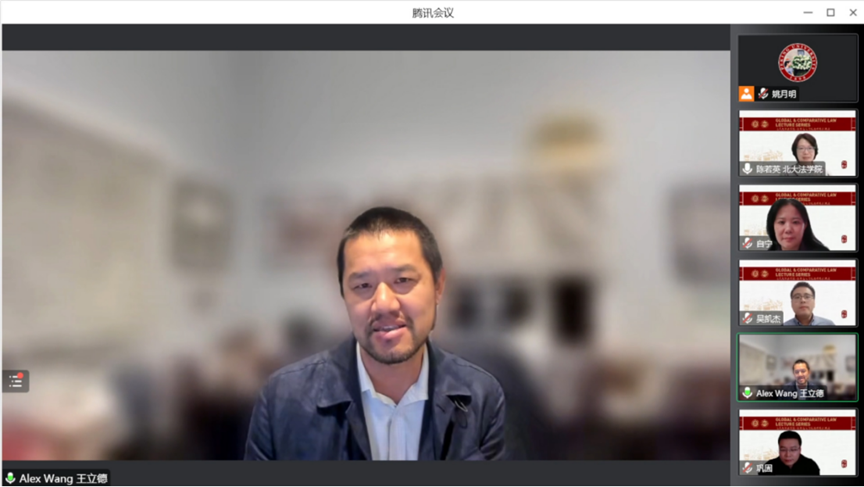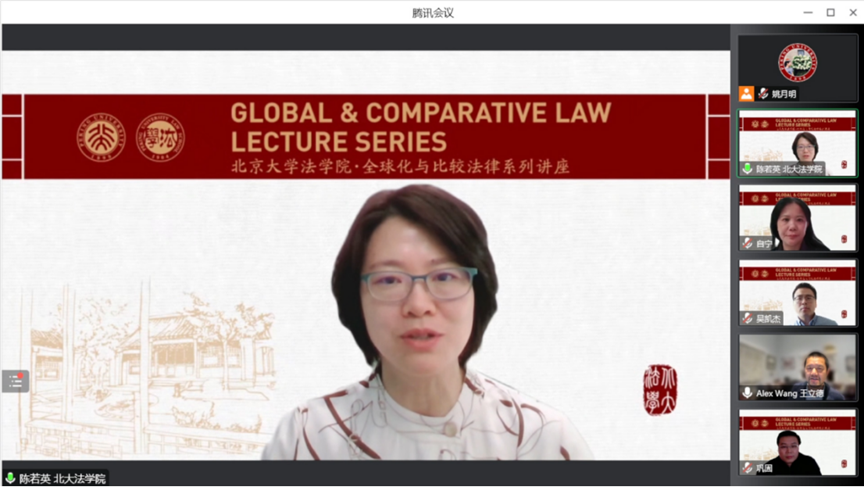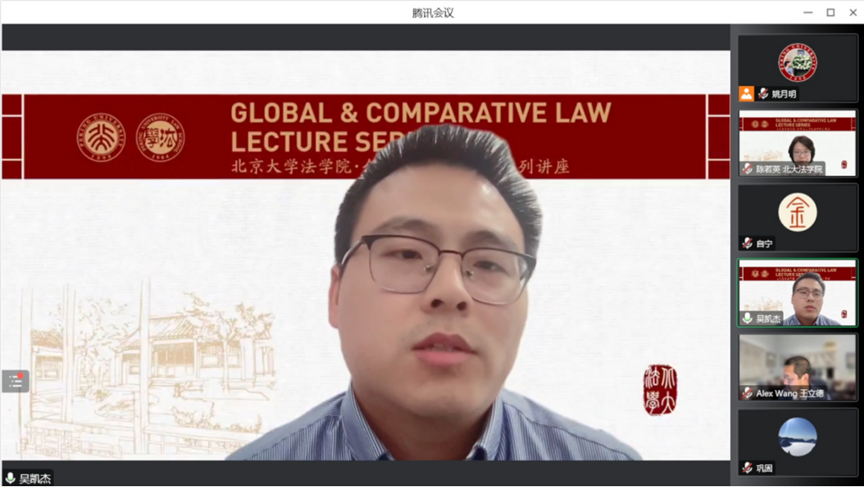The series of lectures on globalization and comparative law at Peking University Law School - Alex Wang, a professor at the University of California, Los Angeles Law School and codirector of the Emmett Institute for Climate Change and Environment, was successfully held
Date:2023-05-11
On December 4, 2022, Alex Wang, a professor at the University of California, Los Angeles Law School and codirector of the Emmett Institute for Climate Change and Environment, as the keynote speaker of the "Global & Comparative Law" series of courses at Peking University School of Law, successfully held a lecture on the theme of "Emissions Trading in California". This lecture was hosted by A.P. Chen Ruoying from Peking University Law School, with researcher Jin Zining, researcher consolidation, and assistant professor Wu Kaijie from Peking University Law School serving as speakers. More than 200 people participated online.
This article presents the core content of the lecture in the form of a transcript.
Alex Wang:
The content of this lecture mainly revolves around the report "Emissions Trading in California" that I and my team previously wrote, including the emission trading system for traditional pollutants and greenhouse gases. I hope to provide Chinese scholars and government departments with California's experience and lessons. The report is specifically divided into three parts: firstly, the debate on emissions trading; Secondly, an introduction to two specific cases; Thirdly, regarding foreign views on the Chinese system.

Chen Ruoying:
Prof. Wang's introduction is very enlightening for us to consider the existing obstacles and whether various factors are mature. Prof. Wang's criticism of the emissions trading system in his report lies in the fact that the system did not achieve the expected environmental effects; However, it may be more important to inquire whether similar resources can be invested in other systems to achieve matching environmental effects.

Alex Wang:
The United States has a strong ideological background and there is significant controversy over the role of the market and government. However, China may be more accustomed to administrative measures, and using different mechanisms together would have a better effect.
Jin Zining:
Prof. Wang's introduction is of great reference and inspiration for the promotion and practical exploration of China's current emission trading system. I have three questions about the similarities, differences, and correlations between traditional pollutant trading and carbon trading.The first question is, besides lobbying by companies, what are the reasons for the failure of traditional pollutant emissions trading in California? The second question is whether we can further share the experience and lessons of California on carbon market price control? The third question is, from the experience of California, how can the design of carbon trading markets incorporate pollution reduction considerations?

Alex Wang:
There are two main reasons for the poor effectiveness of traditional pollutant trading mechanisms. First, the energy crisis in 2000 caused the price of emission rights to be too high, and the government narrowed the coverage of the market. Secondly, under the Clean Air Act of the United States, states have the authority to design state implementation plans for reducing emissions.
It is also important to set a minimum price for price control. At present, California has the lowest and highest prices, and the lowest prices have been increasing year by year, prompting companies to be affected by this signal to reduce emissions.
Regarding the collaborative governance of pollution reduction and carbon reduction, these two markets are currently separate from each other in California, both at the government and corporate levels. There are certain historical reasons for this. Collaborative governance requires all parties to enhance their own capabilities and increase experience. Without existing international experience, it may also be a good opportunity for China to explore.
Gong Gu:
The report by Prof. Wang 's team comprehensively and systematically introduces the most active, advanced, and successful local experiences and valuable lessons of the United States in addressing climate change. I would like to ask Prof. Wang two questions. The first question is how does the United States currently handle excessive carbon emissions or underreporting of carbon emission obligations? Can civil litigation or natural resource damage compensation litigation be applied to the field of climate change? The second question is what is the power base for the US government to intervene in carbon emissions? Is there a higher-level basis besides the Clean Air Act?

Alex Wang:
Regarding the consequences of concealment or excessive emissions, criminal and civil liability are often pursued in the United States, but specific applicable situations need to be investigated according to corresponding legal provisions. Regarding public interest litigation, it is often difficult to win a lawsuit against insufficient government regulation. Because the court knows that government departments always have insufficient resources, the government has discretion in the allocation of law enforcement resources. Of course, if the enterprise clearly exceeds the emission limit, or if the law has clear requirements but fails to do so, a public interest lawsuit can be filed.
Regarding the legal basis, the proposal of a carbon trading system is accompanied by a debate on whether this mechanism is a tax. If it is classified as a tax, it can only be passed through legislation with a two-thirds ratio rather than a simple majority; There is also uncertainty here. When California passed carbon trading market legislation, advocates made many compromises to gain more support votes.
Wu Kaijie:
In economics, carbon tax is considered to be lower in cost, more feasible, and can provide a stable Price signal, but it has encountered great obstacles in the practice of both China and the United States. My question is, if considering the possibility of authorizing legislation, can carbon taxes be imposed at the federal and state levels in the United States as a supplement to carbon emission trading mechanisms? If a levy is imposed, how can it effectively cooperate with the carbon emissions trading system?

Alex Wang:
The issue of taxation in the United States is mainly a matter of political acceptability. This year, the Inflation Reduction Act in the United States may be the strongest climate change law in American history, primarily utilizing subsidy mechanisms. There is not much possibility of imposing a carbon tax in the United States in the near future.
The background of the Inflation Reduction Act is the competition between the US government and the Chinese government. This kind of competition has the constructive side that I propose, but it may also have negative consequences. For example, the US approach will increase the prices of solar energy and other products, which may be detrimental to global climate change actions and may not achieve the goal of encouraging US companies to compete with Chinese companies and develop the domestic economy. In contrast, China's policies have lowered the prices of solar energy, wind power, and batteries, which have greatly helped the world.
Introduction to the speaker:
Alex Wang is a professor at the University of California, Los Angeles School of Law and codirector of the Emmett Institute for Climate Change and Environment. He focuses on studying the relevant laws and politics of environmental governance in China, covering areas such as China's climate policy, Sino US environmental cooperation and competition, environmental bureaucracy, information disclosure, public interest litigation, the role of state-owned enterprises in environmental governance, and the symbolic use of governance reform.
Translated by: Tu Wanting
Edited by: Wang Ding



